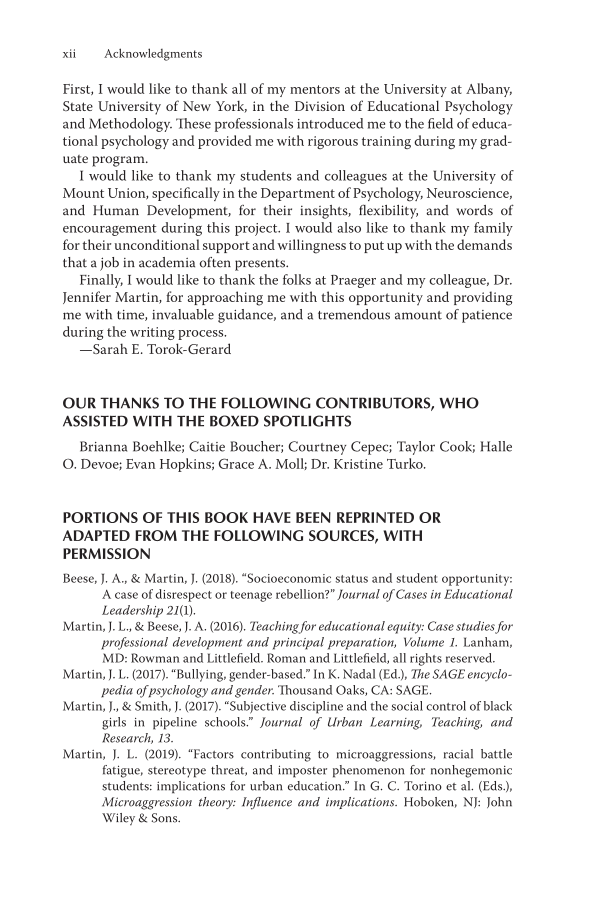xii Acknowledgments First, I would like to thank all of my mentors at the University at Albany, State University of New York, in the Division of Educational Psychology and Methodology. These professionals introduced me to the field of educa- tional psychology and provided me with rigorous training during my grad- uate program. I would like to thank my students and colleagues at the University of Mount Union, specifically in the Department of Psychology, Neuroscience, and Human Development, for their insights, flexibility, and words of encouragement during this project. I would also like to thank my family for their unconditional support and willingness to put up with the demands that a job in academia often presents. Finally, I would like to thank the folks at Praeger and my colleague, Dr. Jennifer Martin, for approaching me with this opportunity and providing me with time, invaluable guidance, and a tremendous amount of patience during the writing process. —Sarah E. Torok-Gerard OUR THANKS TO THE FOLLOWING CONTRIBUTORS, WHO ASSISTED WITH THE BOXED SPOTLIGHTS Brianna Boehlke Caitie Boucher Courtney Cepec Taylor Cook Halle O. Devoe Evan Hopkins Grace A. Moll Dr. Kristine Turko. PORTIONS OF THIS BOOK HAVE BEEN REPRINTED OR ADAPTED FROM THE FOLLOWING SOURCES, WITH PERMISSION Beese, J. A., & Martin, J. (2018). “Socioeconomic status and student opportunity: A case of disrespect or teenage rebellion?” Journal of Cases in Educational Leadership 21(1). Martin, J. L., & Beese, J. A. (2016). Teaching for educational equity: Case studies for professional development and principal preparation, Volume 1. Lanham, MD: Rowman and Littlefield. Roman and Littlefield, all rights reserved. Martin, J. L. (2017). “Bullying, gender-based.” In K. Nadal (Ed.), The SAGE encyclo- pedia of psychology and gender. Thousand Oaks, CA: SAGE. Martin, J., & Smith, J. (2017). “Subjective discipline and the social control of black girls in pipeline schools.” Journal of Urban Learning, Teaching, and Research, 13. Martin, J. L. (2019). “Factors contributing to microaggressions, racial battle fatigue, stereotype threat, and imposter phenomenon for nonhegemonic students: implications for urban education.” In G. C. Torino et al. (Eds.), Microaggression theory: Influence and implications. Hoboken, NJ: John Wiley & Sons.
Document Details My Account Print multiple pages
Print
You have printed 0 times in the last 24 hours.
Your print count will reset on at .
You may print 0 more time(s) before then.
You may print a maximum of 0 pages at a time.

































































































































































































































































































































































